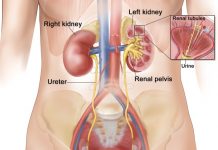There are mainly two types of bladder cancer [bladder cancer symptoms] known to date and a few other rare types that are still under investigation. The most common being transitional cell bladder cancer {TCC} as nearly all cancer starts in the transitional cells, which are found on the lining of the bladder.
These cancers are termed urothelial cell cancers. If the cancer grows within the wall muscle of the bladder it is known as invasive cancer but if it grows on the inner lining it is known as papillary bladder cancer.
There is also another type known as Carcinoma in situ {CSI} that is an early bladder cancer, which in appearance is an ulcerated red area in the bladder. If growth is rapid then it may develop into a large tumor called invasive cancer. Squamous cell cancer and adenocarcinoma are still under investigation because they rarely occur in humans but cases found so far are invasive.
Chemotherapy involves the use of drugs such as methotrexate, vinblastine, Adriamycin and cisplatin as with the MVAC treatment to treat cancer. It stops the growth of cancer cells, which renders them inactive and subsequently destroys them.
Depending on the size of the tumor of the bladder the doctor will either recommend a “cycle” of chemotherapy which is just one round or a “course” of chemotherapy which is a series of cycle.
In a study done by researchers in New England it was found that chemotherapy for muscle invasive bladder cancer improved survival rates as compared to the patient just undergoing surgery alone. If the tumor is really large then combination treatment is recommended [Bladder cancer treatment].
One undergoes chemotherapy first to kill the cancer, then surgery to remove the growth and if the cancerous cells had spread to other areas then more chemotherapy is done to kill these offshoot growths.
With the new developments made in the medical field chemotherapy has fewer side effects and dosages have been reduced. Perfusion therapy is just one example of such developments; it is the most aggressive and direct way to deliver chemotherapy right to the tumor without subjecting the whole body to the treatment thus reducing side effects.
Presurgical chemotherapy doubles the survival rate of bladder cancer patients. It is also believed that it can also totally destroy the cancer if the growth has not advanced greatly. In a case study of 100 people who received presurgical chemotherapy it was found that 38% had no cancer and did not need surgery.
Stage2 and stage3 bladder cancers require surgery but to increase the survival rate by 80 to 90% one should also have presurgical chemotherapy. The 5-year survival rate will improve to 57% for patients who had combination treatments compared to 42% for those who had cystectomy only.











